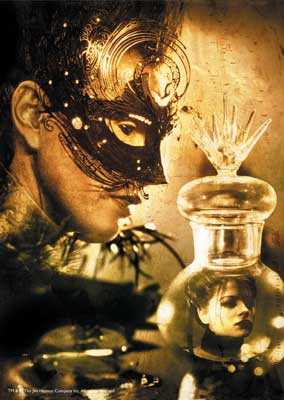 The first full-fledged big screen
collaboration for longtime creative partners Dave McKean and Neil Gaiman,
MirrorMask continues many themes and ideas that the two men had pioneered in
their work as creators of comic books and other narrative forms. While
this movie shows that they both have a potentially great future in the world of
movies, with creativity and imagery rivaling almost anything that Hollywood has
been able to produce, they make the mistake of not approaching filmmaking any
different than they have their graphic novels. Comic books have always
been more of an artistic medium, emphasizing lean characterizations, minimalist
dialogue, and a high quotient of art. Movies are more plot driven, and
while Gaiman and McKean do a decent job in setting up the basic premise of the
film, the plot gets lost in the shuffle between each impressively rendered
special effects showcase.
The first full-fledged big screen
collaboration for longtime creative partners Dave McKean and Neil Gaiman,
MirrorMask continues many themes and ideas that the two men had pioneered in
their work as creators of comic books and other narrative forms. While
this movie shows that they both have a potentially great future in the world of
movies, with creativity and imagery rivaling almost anything that Hollywood has
been able to produce, they make the mistake of not approaching filmmaking any
different than they have their graphic novels. Comic books have always
been more of an artistic medium, emphasizing lean characterizations, minimalist
dialogue, and a high quotient of art. Movies are more plot driven, and
while Gaiman and McKean do a decent job in setting up the basic premise of the
film, the plot gets lost in the shuffle between each impressively rendered
special effects showcase.
Stephanie Leonidas (Yes, Wall of Silence) stars as 15-year-old
Helena, born into a family of circus performers, and as wonderful as that might
seem to an outsider, she secretly longs for a normal, stable life.
Tensions begin to mount between the precocious Helena and her parents, but
things change when Helena's mother, Joanne (McKee,
Croupier) becomes hospitalized with a
potentially fatal illness. With a lot on her mind, Helena "wakens" to find
herself in a strange land that appears to be of her own making, full of people
in her life and designs she has previously conceived of. However, there's
no easy way out of this parallel universe, save for a quest to find the fabled MirrorMask, which appears to hold the key to everything she might hold dear.
MirrorMask is a sumptuously crafted
piece of flowing art design, done by Jim Henson Productions, fittingly enough --
it was Henson's studio that brought forth a similarly premised film in the
1980s, Labyrinth. As the storyline
changes into the dream world, the special effects and wondrous creatures
designed by McKean take hold of the film, which are beautiful to behold, even grotesque,
and all painstakingly
detailed. In fact, the visual elements are so strong, they almost command
at least one viewing for audiences that love works of fantasy, particularly
those attracted by art and costume design.
For all of its technical brilliance, what
MirrorMask lacks is an emotional core. A girl fighting for the
potential fate of her ailing mother should have had much more of a rooting
interest, and yet, there is a detached quality to the film that keeps emotions
almost completely at bay. Part of the problem has to do with Gaiman's
fanciful and surreal writing style. As a writer, Gaiman's gift for words
and ideas is often brilliant, but here, he is handcuffed by only being able to
write dialogue for his characters. For all of Gaiman's prodigious talents,
capturing the essence of his characters through dialogue alone hasn't been a
real strong suit of his.
That's not to say it's Gaiman's fault at
all, as it is generally the director that sets the pace and tone of the film.
Unfortunately, McKean appears to be so enlivened by creating this mystical world
where anything can happen, the characters take a backseat to the richly designed
creatures and artwork. It also doesn't quite help that most of the
supporting characters are either wearing masks or are other-worldly creatures
altogether, making it difficult to capture emotional elements through voice
patterns alone. Stephanie Leonidas does manage to turn in a very good
performance, despite the difficulties of acting to environs that are created in
post-production.
While there is a disconnection present
between the heart and mind of the overall story, ultimately, MirrorMask
is just too intelligent and creative in scope to dismiss outright. It's
easy to see that this is the kind of film that will eventually be regarded as a
cult classic, and certainly there will most likely be an audience out there that
thinks this to be utterly brilliant in every way. I won't argue
against these feelings, except to say that, while I concede that McKean's film is a real
accomplishment in terms of aesthetics, most of the time I spent watching the
movie was in admiring the look and sound of it, instead of really caring about
the plight of Helena and her ailing mother.
Visually rich yet emotionally vacant,
MirrorMask proves to be a worthwhile experience for escaping into an artistic world
bizarre. If only the creators would have worked as hard on the story and
development of their characters as they had on each individual little creature,
perhaps we'd have a masterpiece to rave about, instead of just an alluring,
ambitious oddity. MirrorMask proves to be just like looking into a
mirror itself -- the images shown are lifelike and vivid in every detail, but
the humanity we see is merely a reflection - a two-dimensional representation
with no depth or soul of its own.
Qwipster's rating:





©2006 Vince Leo

